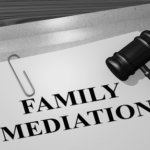In recent years, the progress made in achieving marriage equality and recognizing the rights of same-sex couples has been significant. However, like any married couple, same-sex couples may face challenges that can lead to divorce. One particular area of concern in same-sex divorces is child custody battles. In this blog post, we will explore the evolution of child custody battles in same-sex divorce cases, specifically within North Dakota.
Same-Sex Divorce & Custody In North Dakota
North Dakota, like many other states, recognizes same-sex marriages and provides the same legal procedures for same-sex couples seeking a divorce. While child custody battles are emotionally challenging for any couple, they can be especially challenging for same-sex couples who face additional biases and stereotypes unique to their situation. The courts, however, are guided by N.D.C.C. § 14-09-06.2, which outlines what is known as the “best interests of the child” factors. The court uses these factors when determining custody arrangements, regardless of the parent’s sexual orientation. Understanding how North Dakota courts evaluate custody decisions can help parents prepare and present their cases effectively.
Challenging Biases And Stereotypes
A majority of the challenges that arise for same-sex couples in custody battles revolve around the biases or stereotypes that can impact the court’s decision-making process.
Over three decades ago, North Dakota’s stance on same-sex child custody battles was considerably more rigid and limited in its outlook. In the case of Jacobson v. Jacobson, 314 N.W.2d 78 (N.D. 1981), the North Dakota Supreme Court concluded that children with a lesbian or gay parent could face inherent “harm” due to the negative impact of societal disapproval and made it the deciding factor in awarding custody to the heterosexual parent. The court reasoned:
“. . . we cannot lightly dismiss the fact that living in the same house with their mother and her lover may well cause the children to ‘suffer from the slings and arrows of a disapproving society’ to a much greater extent than would an arrangement wherein the children were placed in the custody of their father with visitation rights in the mother. Although we agree with the trial court that the children will be required to deal with the problem regardless of which parent has custody, it is apparent to us that requiring the children to live, day-to-day, in the same residence with the mother and her lover means that the children will have to confront the problem to a significantly greater degree than they would if living with their father.” Id. at 81. (emphasis added).
Consequently, this decision effectively established a presumption that children residing in a same-sex household would be “harmed.”
In 2003, however, there was a significant shift in this notion with the court’s ruling in Damron v. Damron, 2003 ND 166, 670 N.W.2d 871. The historic win for a mother of two in Mandan, North Dakota, marked a substantial departure from previous perspectives, as the courts embraced a more inclusive and progressive approach to same-sex child custody battles in our state. At the district court, the husband petitioned the court for a change of custody and requested that he be awarded primary residential responsibility for the parties’ children on the basis that his ex-wife had started living with another woman in a same-sex relationship. Id. at 873. He cited the then-governing presumption set out in Jacobson. Id. However, on appeal, the North Dakota Supreme Court overruled their prior decision in Jacobson and instead emphasized the important considerations of the best interests of the child factors. Id. at 875. The Court established that as a matter of law, a same-sex parent could not be deemed unfit solely based on being in a same-sex relationship, provided there is no evidence indicating an adverse effect on the child. Id.
A New Era Of Inclusivity
In 2015, same-sex marriage became legal across the country following the decision in Obergefell v. Hodges, 576 U.S.644 (2015). In 2019, same-sex adoption became legal in all 50 states. North Dakota’s adoption laws are governed by N.D.C.C. 14-15-03 and now include more inclusive language to allow for same-sex adoption. The effect of all the new legislation enacted in the past few years has worked together to establish a more equitable process for same-sex couples. Fast forward to 2023, same-sex relationships are increasingly prevalent and more accepted in society. As it pertains to child custody, North Dakota law does not distinguish between same-sex and heterosexual parenting rights. This means that under N.D.C.C. 14-20, both biological and non-biological parents can establish legal rights and responsibilities. In certain situations, North Dakota goes as far as acknowledging parenting rights and responsibilities to nonparents.
Mediation And Co-Parenting Plans
Same-sex parents also have the same opportunity to qualify for mediation. What is mediation? Mediation is a process encouraged by courts for divorcing couples to reach amicable agreements in a less confrontational environment. Mediation can help couples create mutually beneficial co-parenting plans, addressing issues such as custody, visitation, and decision-making authority. Mediation can be a cost-effective and less adversarial alternative to litigation. It also allows parents to have more control over the outcome. As long as the parenting plan aligns with the “best interests of the child” factors, the court typically approves the plan without interference.
Notably, North Dakota offers a publicly-funded Family Law Mediation Program for cases that involve children. According to Rule 8.1 of the North Dakota Rules of Court, any case involving parental rights and responsibilities, paternity, relocation of children, or grandparent visitation is automatically referred to the family mediation program within ten (10) days of filing the summons and complaint with the court. N.D.R.Ct. 8.1(c)(1). Additionally, these specific types of cases are entitled to receive six (6) free hours of mediation services. N.D.R.Ct. 8.1(c)(5).
In cases where parties are unable to reach an agreement on a parenting plan, the court intervenes, and the case is presented for a trial.
Conclusion
While progress has been made in this specific legal realm, it is important to note that family law can be complex, and individual circumstances may vary. For that reason, it is crucial to work closely with a family law attorney who can help you challenge any ongoing stereotypes and who understands the legal landscape. Remember, no matter the challenges faced, the ultimate goal is to ensure the well-being and happiness of the children involved.
For more information, contact the SW&L family law team at 701-297-2890 or email us at: info@swlattorneys.com.
The information contained in this article and on this website is for informational purposes only. Do not rely on the information on this website as legal advice. Please refer to the full disclaimer here.










